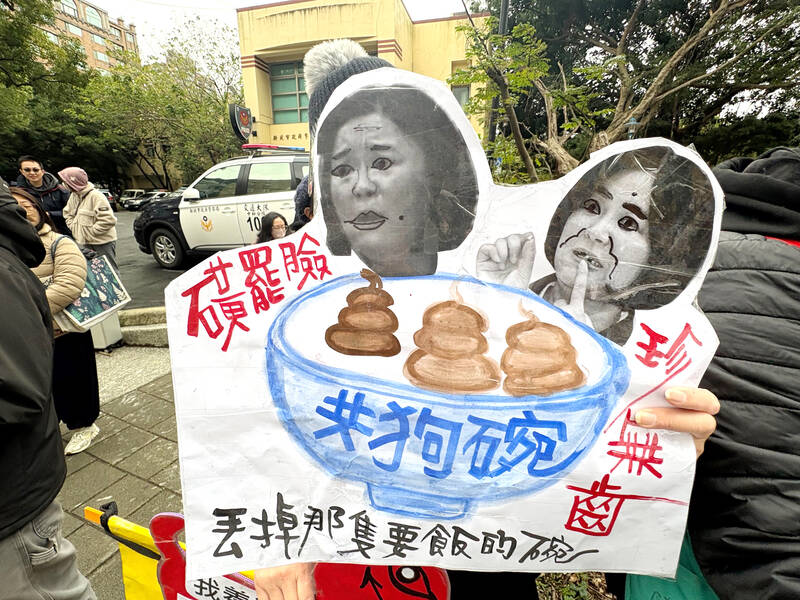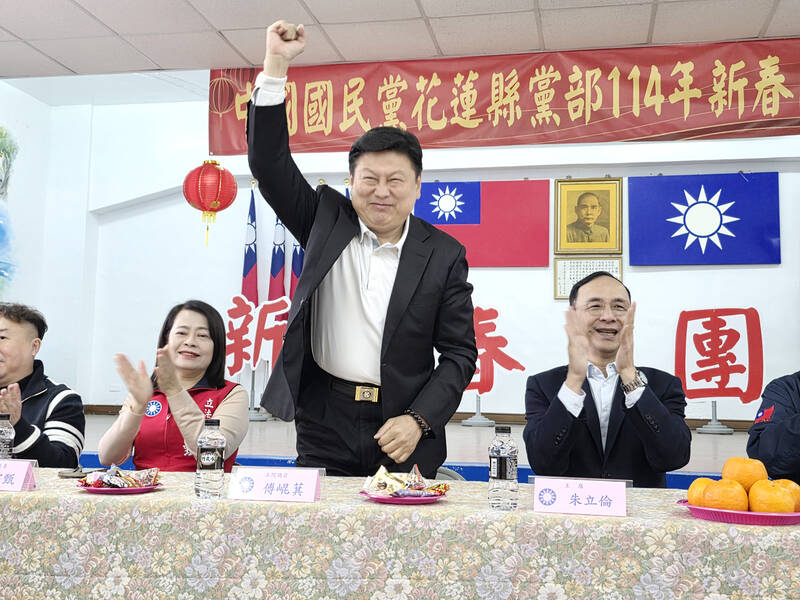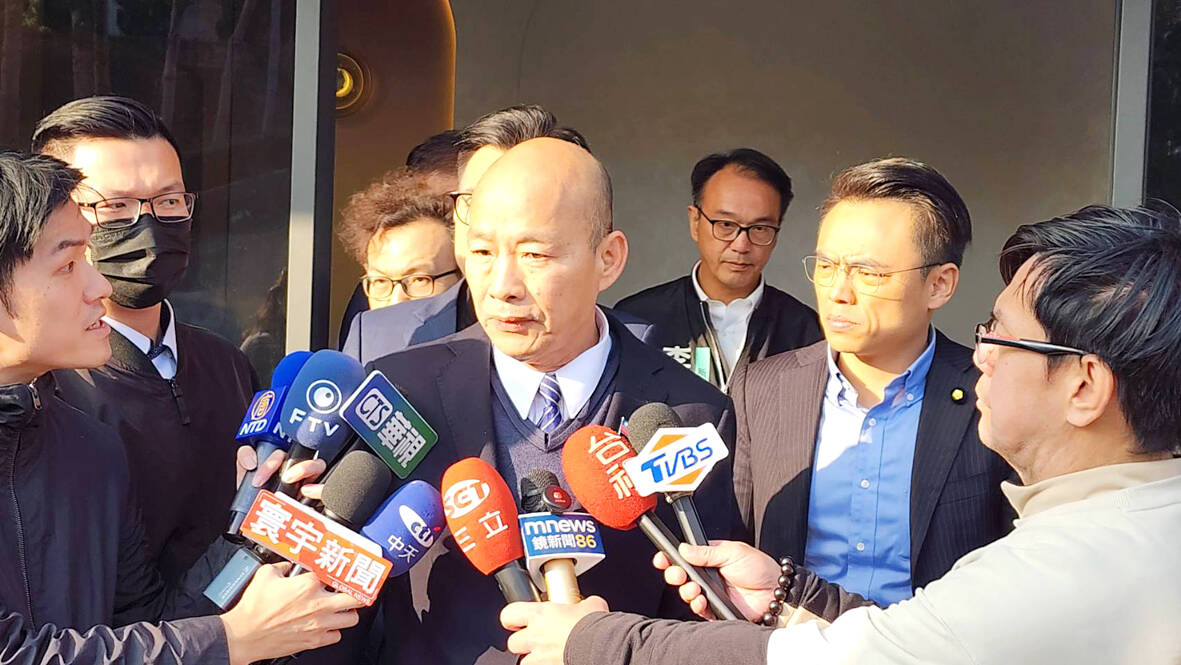Chinese Nationalist Party (KMT) legislative caucus convener Fu Kun-chi (傅?萁) and some in the deep blue camp seem determined to ensure many of the recall campaigns against their lawmakers succeed. Widely known as the “King of Hualien,” Fu also appears to have become the king of the KMT.
In theory, Legislative Speaker Han Kuo-yu (韓國瑜) outranks him, but Han is supposed to be even-handed in negotiations between party caucuses — the Democratic Progressive Party (DPP) says he is not — and Fu has been outright ignoring Han. Party Chairman Eric Chu (朱立倫) isn’t taking the lead on anything while Fu appears to be in charge of the party’s agenda.
Recently while trying to get both sides back to the negotiating table, Han appeared to confirm this is the case when he essentially threw up his hands and said to the pan-green side “Oh! ‘Little Fu’ (‘little’ being an endearment indicating friendship) is really big now.” Han expressed frustration when he negotiated a cross-caucus negotiation on the budget on Tuesday last week and Fu did not even bother to show up.

Photo: Chen Yi-hsun, Taipei Times
Instead, Fu flew to Hong Kong for a travel show to promote Hualien on behalf of the government. According to a SETN News report, he then joined a dinner that included Hong Kong city councilors close to the Chinese Communist Party (CCP) and China’s United Front Work Department (UFWD).
Upon returning the same evening, at Hualian Airport a man repeatedly shouted at him “Chinese Communist running dog, Fu Kun-chi!”
‘THE FOUR KMT HORSEWOMEN’

Photo: Hua Meng-ching, Taipei Times
Fu and others in the party are going out of their way to double down on convincing voters that they are working to paralyze the government for political gain, undermine the constitution, weaken national defense and work for the CCP over the interests of Taiwanese people. Fu’s choices last Tuesday are very emblematic.
Similarly, other lawmakers like the “Four KMT Horsewomen of the Constitutional Apocalypse” of Jennifer Chen (陳玉珍), Hsu Chiao-hsin (徐巧芯), Weng Hsiao-ling (翁曉玲) and Ma Wen-chun (馬文君) are frequently in the news for pro-China statements, attacking the military budget, promoting Chinese identity and in Ma’s case playing fast and loose with national secrets on Taiwan’s indigenous submarine program.
Chen has been so forceful that the press refers to her as “Kinmen tank (金門坦克),” while Hsu likens herself to a honey badger because they are “vicious and merciless” (心狠手辣), proudly describes herself as an “evil woman” (惡女) and is famous for digging up dirt to smear opponents.

Photo: Tsai Chang-sheng, Liberty Times
High-ranking KMT politicians like Chu, New Taipei Mayor Hou Yu-ih (侯友宜) and Taichung Mayor Lu Shiow-yen (盧秀燕) all know this turns off voters. It also adds fuel to the recall campaigns that 35 against KMT caucus lawmakers look set to reach stage two, versus only 17 against Democratic Progressive Party (DPP) legislators. Speaker Han is also well aware of this, as he was successfully recalled as Kaohsiung mayor by a similar pan-green movement.
Why is Fu and his allies intentionally creating the fear and outrage that boosts the recall campaigns chances of success?
It appears there is not any electoral strategy at all, and the power struggle with the DPP administration has consumed them. Perhaps they assume voters will forget everything in a few months.
There is an ideological Chinese identity element guiding their behavior. Chen is from Kinmen and is unambiguously Chinese, and blasted huge holes in the Ministry of Culture budget because she is firmly against anything promoting Taiwanese identity.
In Hsu’s case she also personally thrives on creating outrage and controversy.
Recently Taiwan People’s Party (TPP) Chairman Huang Kuo-chang (黃國昌) has been touting his party as pro-Taiwan, but in practice is supporting the KMT’s Chinese identity politics. It is telling that he has also recently started sporting a Republic of China lapel pin of the type popular with KMT politicians.
THE DPP’S STRATEGY
They are providing so much ammunition to the recall campaigns that it makes it easy for the DPP to help nudge them along — though officially they have no role.
While many of the cuts and frozen portions of the budget are real and painful, they do not “paralyze” the government as much as they say. It appears even Fu and the KMT knew if they totally paralyzed the government would be political suicide, but they are hobbling the DPP administration.
This is supported by split-screen messaging by the administration. On one hand bemoaning the budget cuts, while on the other announcing all sorts of new spending.
There is a constitutional crisis brewing, most clearly evidenced by the KMT eviscerating the Constitutional Court, but also its cutting necessary defense spending, ravaging the Ministry of Culture and engaging in some very alarming CCP-friendly behavior.
The Lai administration just decertified three Chinese universities connected to the UFWD, including what was said to be Fu’s alma mater Jinan University — though he now says he only studied there for a few months and did not actually graduate. This should have been done years ago, but the timing does look intentional to raise suspicions further about Fu.
PAST BEHAVIOR, FUTURE RECALL?
Fu, “The Four KMT Horsewomen” and others like them are also running another risk — they are generating a lot of negative attention and in many cases outright hostility. Historically, the recall votes that have succeeded have all been of people who offended a lot of people.
Former Taiwan Statebuilding Party Legislator Chen Po-wei (陳柏惟) was famously provocative, pugnacious and liked legislative brawling, while Taoyuan City Councilor Wang Hao-yu (王浩宇) of the DPP was a famously nasty online personality towards pan-blues and loved generating controversy. Both were recalled.
In spite of being in a blue district, Independent Legislator Freddy Lim’s (林昶佐) recall failed despite being a deep green, left-wing politician. He had a friendly, cooperative attitude, showed genuine concern for his constituents and was hard to dislike.
Similarly, then-independent Kaohsiung City Councilor Huang Jie (黃捷) was a friendly personality — in spite of a famous mocking eye-rolling incident against then-Mayor Han — and she survived her recall.
Jennifer Chen is in one of the deepest blue constituencies and the stage one recall campaign against her came up short by a few dozen votes, while Weng Hsiao-ling is a party list legislator and therefore safe.
Of the politicians highlighted in this column, the other three are in pan-blue-leaning districts but are at risk. Fu Kun-chi won his district with 53.8 percent of the votes, Ma Wen-chun with 53.1 and Hsu Chiao-hsin with 52.6 percent.
This is a national movement motivated by outrage and fear — if it continues to the actual recall votes — will also likely boost turnout. A recent Mirror Media poll found that 78.3 percent plan to vote in the recalls, and in almost all districts the DPP had easily won more than a quarter of the votes — usually more than 40 percent.
Fu, “The Four KMT Horsewomen” and others like them should be very nervous because their combative personalities and the scandals in their past have made them a lot of enemies. With the low recall threshold all that is required is that more disgruntled people come out and vote “yes” and that they are at least 25 percent of the district electorate.
Once ousted in a recall, they cannot run in the subsequent by-election.
This year is going to be a wild ride.
Donovan’s Deep Dives is a regular column by Courtney Donovan Smith (石東文) who writes in-depth analysis on everything about Taiwan’s political scene and geopolitics. Donovan is also the central Taiwan correspondent at ICRT FM100 Radio News, co-publisher of Compass Magazine, co-founder Taiwan Report (report.tw) and former chair of the Taichung American Chamber of Commerce. Follow him on X: @donovan_smith.

This is the year that the demographic crisis will begin to impact people’s lives. This will create pressures on treatment and hiring of foreigners. Regardless of whatever technological breakthroughs happen, the real value will come from digesting and productively applying existing technologies in new and creative ways. INTRODUCING BASIC SERVICES BREAKDOWNS At some point soon, we will begin to witness a breakdown in basic services. Initially, it will be limited and sporadic, but the frequency and newsworthiness of the incidents will only continue to accelerate dramatically in the coming years. Here in central Taiwan, many basic services are severely understaffed, and

Jan. 5 to Jan. 11 Of the more than 3,000km of sugar railway that once criss-crossed central and southern Taiwan, just 16.1km remain in operation today. By the time Dafydd Fell began photographing the network in earnest in 1994, it was already well past its heyday. The system had been significantly cut back, leaving behind abandoned stations, rusting rolling stock and crumbling facilities. This reduction continued during the five years of his documentation, adding urgency to his task. As passenger services had already ceased by then, Fell had to wait for the sugarcane harvest season each year, which typically ran from

It is a soulful folk song, filled with feeling and history: A love-stricken young man tells God about his hopes and dreams of happiness. Generations of Uighurs, the Turkic ethnic minority in China’s Xinjiang region, have played it at parties and weddings. But today, if they download it, play it or share it online, they risk ending up in prison. Besh pede, a popular Uighur folk ballad, is among dozens of Uighur-language songs that have been deemed “problematic” by Xinjiang authorities, according to a recording of a meeting held by police and other local officials in the historic city of Kashgar in

The People’s Republic of China (PRC) was out in force in the Taiwan Strait this week, threatening Taiwan with live-fire exercises, aircraft incursions and tedious claims to ownership. The reaction to the PRC’s blockade and decapitation strike exercises offer numerous lessons, if only we are willing to be taught. Reading the commentary on PRC behavior is like reading Bible interpretation across a range of Christian denominations: the text is recast to mean what the interpreter wants it to mean. Many PRC believers contended that the drills, obviously scheduled in advance, were aimed at the recent arms offer to Taiwan by the